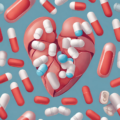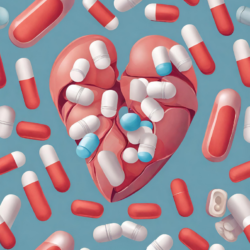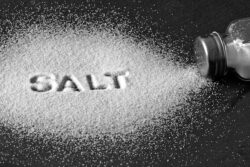Statins are some of the most popularly prescribed medications on the market with 1 in 4 Americans taking statin drugs (2011). Do they work? To read the read the early reports statins were wonder drugs, capable of reducing heart attack and extending lifespan with few side effects. No need to change one’s diet or lifestyle, simply take a statin and live longer.
Over the years, the statin market has expanded to include kids as young as 8 years old: “statin therapy is considered first-line treatment for pediatric patients with abnormal lipid levels.” When combined with our love affair with vaccines, the latest proposal includes a cholesterol vaccine for children at risk for heart disease. And since 75% of Americans are still not heeding the anti-cholesterol warning, intense industry lobbying successfully changed the risk equation for statin prescriptions, immediately expanding the market potential by millions more Americans and billions of additional revenue.
Statins for Health – Maybe Not
With 1 and 4 Americans taking statins and cholesterol levels presumably controlled to within the designated healthy ranges, one might expect a concomitant reduction in heart disease and heart disease related mortality across the population. One would be wrong. Despite controlling cholesterol, Americans are as unhealthy as ever, living with increasingly more chronic diseases and dying at higher rates than ever before. Is it possible we were wrong about the relationship between cholesterol and heart function? Is it possible in our exuberance to offer simple solutions to complex disease processes we have been exacerbating the very conditions we seek to treat? Indeed, it is.
Over the last several years, a growing body of evidence suggests that statins are not only not the wonder drugs we had hoped for, but instead, may be quite dangerous, especially for women. Statins induce diabetes (a major contributor to the metabolic dysfunction implicated in coronary artery disease), increase atherogenesis (the buildup fatty plaques responsible for coronary artery disease), and damage mitochondria, an effect that is exacerbated by exercise. As a result, and in non-industry sponsored studies, statin use is associated with higher rates of all-cause mortality, cancer, heart attack, stroke, than non-statin use. Yikes.
Cholesterol Blues
Just how statins induce such negative effects is linked, in large part, to their primary purpose, cholesterol reduction. We need cholesterol. Cholesterol – fat, forms the structure of all cell membranes. We need healthy cell membranes. Fatty acids provide fuel for the production of mitochondrial energy – ATP. ATP is required for all cell functions. Cholesterol is the primary ingredient for steroid hormone synthesis. Steroid hormones regulate everything from reproduction to heart function to central nervous system activity. We need healthy steroid hormone systems. And if those aren’t reasons enough to reconsider cholesterol, the brain needs cholesterol. Reduce the cholesterol in the brain and brain activity deranges, as evidenced by the increasing recognition of statin induced psychiatric and cognitive sequelae. When we reduce cholesterol artificially, we diminish the functioning of every cell in the body by multiple mechanisms.
Cholesterol and Heart Attack
What about the link between high cholesterol and heart attacks? Isn’t it the cholesterol that causes the plaques that block our arteries and cause all sorts of problems? And, aren’t our high fat, high cholesterol diets to blame for this build up? Perhaps not, and especially for women. According to our good friend Kelly Brogan, atherosclerotic plaques and heart disease represent a ‘multi-factorial inflammatory problem with disparate drivers in different people.’ The latest research suggests that these plaques are ‘not merely the passive accumulation of lipids within artery walls‘ but rather represent oxidative stress (mitochondrial damage) with incessant immune mediated inflammatory signals driven by dietary and other factors. This makes sense when we consider that 90% of first time cardiac events can be prevented with dietary and other lifestyle changes and diet and lifestyle effect mitochondrial functioning significantly (the mitochondria drive inflammation).
The most recent research on diet and nutrition suggests diets high in empty calories, carbohydrates and sugars and low in fat are to blame for heart disease, not the high fat diets we have all been taught to avoid. It should be noted, however, that the relationship between fat and health is complex. Too much or too little impairs mitochondrial functioning.
But Wait, There’s More
A research group out of Japan has gone so far as to claim that statins are not only dangerous for the reasons stated above, but statins induce the very diseases they are promoted to protect against. In their most recent publication, Statins Stimulate Atherosclerosis and Heart Failure: Pharmacological Mechanisms, the researchers boldly argue that:
“statins may be causative in coronary artery calcification and can function as mitochondrial toxins that impair muscle function in the heart and blood vessels through the depletion of coenzyme Q10 and ‘heme A’, and thereby ATP generation.”
In English – statins block a whole bunch of important chemical reactions that induce coronary artery disease where there was none before. They argue, rather persuasively, that statins cause the very disease process that they are promoted to prevent. Whoa.
According to this research group, statins create the environment where fatty plagues grow and thrive. They derail our innate mechanisms to clear those plaques by damaging the mitochondria and, in so doing, damage the very foundation of cell function: mitochondrial energy (ATP) production. Without functioning mitochondria (which we have written about on many occasions), cell damage and cell death occur. With enough damage, tissue and organ damage ensue, and complex multifaceted disease processes develop. Mitochondria are the engines of health. ATP is the fuel. No fuel, no function. Statins damage the engine and block the fuel line.
What’s Worse?
Statins are frequently co-prescribed with Metformin (gluocophage) to reduce glucose in Type 2 diabetes. Metformin damages mitochondria and reduces ATP production even further (more on this in a subsequent post). Combined, these two drugs set the stage for chronic disease and increase the need for additional medications that will also damage mitochondria; a rabbit hole that is not easily climbed out of unless one is willing to look beyond the medical model. Remember, one of the largest global studies on heart health found that 90% of first time cardiac events in men can be prevented with dietary and other lifestyle changes, 94% in women. Diet and lifestyle. Sit with that for a moment. Diet and lifestyle changes are all that are needed for most people to prevent heart attack. Diet and lifestyle.
We Need Your Help
More people than ever are reading Hormones Matter, a testament to the need for independent voices in health and medicine. We are not funded and accept limited advertising. Unlike many health sites, we don’t force you to purchase a subscription. We believe health information should be open to all. If you read Hormones Matter, like it, please help support it. Contribute now.
Yes, I would like to support Hormones Matter.
This article was published originally on June 10, 2015.






